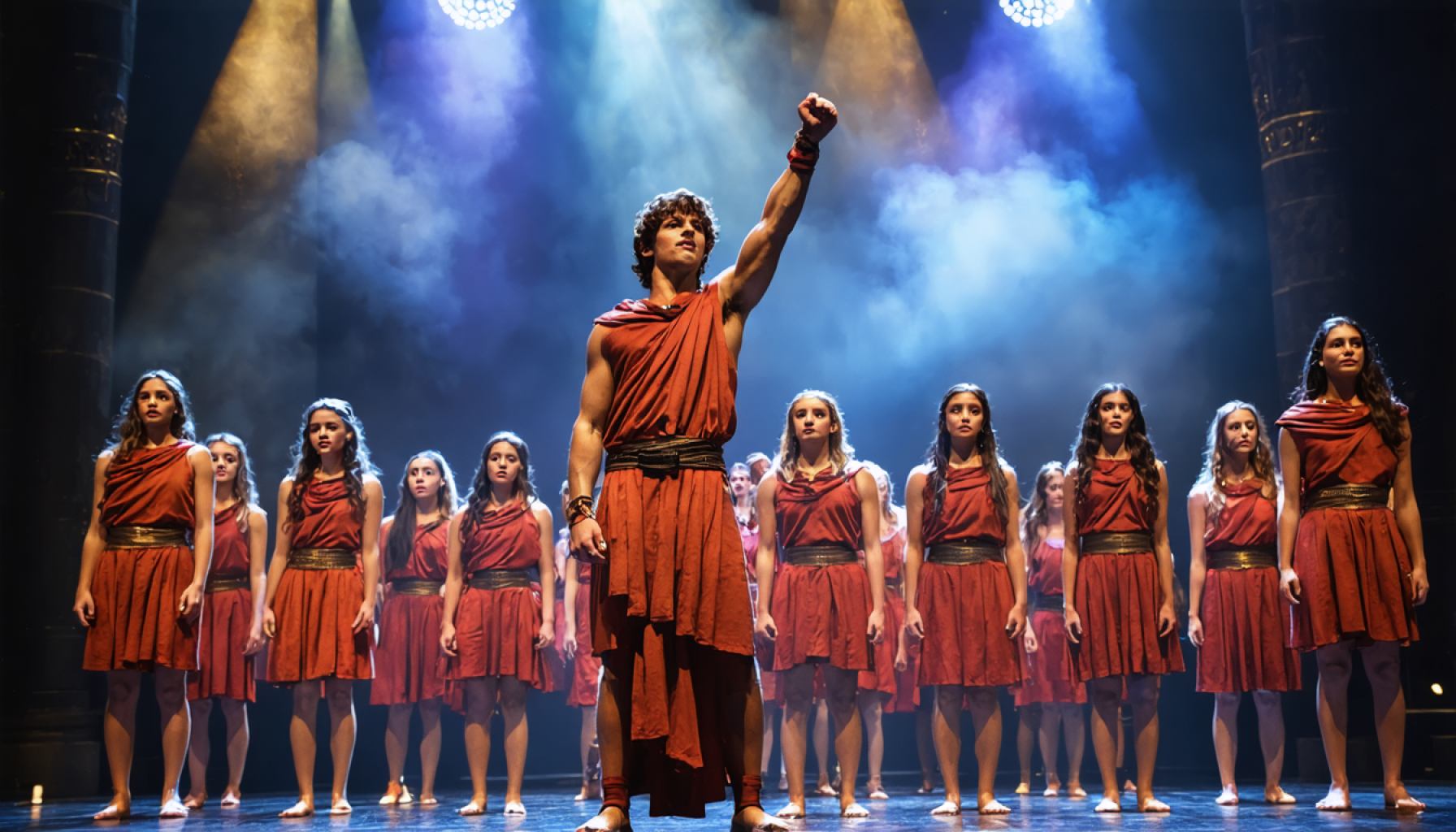- The Lightning Thief: The Percy Jackson Musical was captivatingly staged in St. Andrew’s Sewanee, blending Greek mythology with teenage drama.
- Young actors portrayed demigods, showcasing a story rich in friendship and valor, inspired by Rick Riordan’s book series.
- The production featured a dedicated student-led cast; freshman Elowyn Pate excelled in choreography and acting.
- Despite a virus outbreak before the debut, the cast united, turning adversity into camaraderie.
- Broadway veteran Kristin Stokes guided students, enhancing their portrayal with professional depth.
- The performance highlighted themes of courage, friendship, and mentorship, leaving a lasting legacy.
In the small town of St. Andrew’s Sewanee, where the ancient world of Greek gods collides with teenage reality, an electrifying rendition of The Lightning Thief: The Percy Jackson Musical unfolded. The venue buzzed as young actors, portraying demigods, boldly faced mythical creatures and capricious deities, unveiling an extraordinary theater experience.
As audiences submerged themselves in the gripping tale inspired by Rick Riordan’s beloved book series, they witnessed a story woven with friendship and valor. At the heart of this production was a dedicated student-led cast, with every choreography twist and lighting flicker masterminded by youthful ambition. Freshman Elowyn Pate emerged as a powerhouse, choreographing dynamic numbers while embodying Thalia, the fierce daughter of Zeus.
However, the road to opening night was plagued with challenges. A virus swept through the cast just a week before their debut, erasing any hope of a traditional tech week. Yet, in the face of adversity, unity prevailed. The sudden crisis transformed into an opportunity to solidify bonds amidst stress and impending disaster. As senior Hannah Hardin noted, collective resilience transformed tension into camaraderie, as the team rallied together.
Guided by Broadway veteran Kristin Stokes, who breathed life into Annabeth on stage, the cast honed their characters with depth and authenticity. This mentorship injected professional vigor into the school’s vibrant portrayal.
With every performance, the soul of the show—courage, friendship, and unexpected mentorship—shone brilliantly. Sharing backstage prayers and heartfelt support, these students didn’t just stage a musical; they created a legacy. Their mythical journey, featuring centaurs and cherished connections, left the audience entranced, proving that determination and camaraderie can conquer both ancient and modern challenges.
Discovering the Magic Behind High School Productions: Lessons from “The Lightning Thief: The Percy Jackson Musical”
How-To Steps & Life Hacks
Producing a high-school musical may seem daunting, but breaking it down simplifies the process:
1. Casting & Crew: Choose a balance between experienced members and new talent to foster growth.
2. Rehearsal Schedule: Set a strict but manageable timeline, allowing for flexibility in unforeseen events.
3. Mentorship: Involve professionals or alumni who can offer guidance and insight.
4. Tech Week Preparation: Have contingency plans in place for potential disruptions.
5. Community Involvement: Engage local businesses and media to build anticipation and support.
Real-World Use Cases
Musical theater offers numerous benefits:
– Education: Develops discipline, time management, and teamwork skills.
– Social Skills: Enhances interaction among youths from diverse backgrounds.
– Therapeutic Outlet: Provides a creative escape and emotional release.
Market Forecasts & Industry Trends
Theater for young audiences is evolving:
– Digital Integration: Use of augmented reality to deepen audience engagement.
– Accessibility: Increasing availability of streaming options for performances.
– Diversity: Growing demand for inclusive casts and crews to reflect audiences.
Reviews & Comparisons
“The Lightning Thief” musical is praised for staying true to the spirit of Riordan’s books, infusing humor and relatability. Comparatively, it holds a unique charm against other young adult adaptations by maintaining its whimsical nature and strong storytelling.
Controversies & Limitations
– Performance Rights: Navigating the rights for popular works can be complex and costly.
– Diverse Representation: Ensuring all voices and backgrounds are authentically represented remains a challenge.
Features, Specs & Pricing
Key characteristics of “The Lightning Thief” musical include its vibrant score, highly physical choreography, and character-driven plot. Licensing fees for school performances often include scripts and musical scores, generally ranging from $1,000 to $3,000, depending on school size and access to additional resources.
Security & Sustainability
– Safety: Implement contact tracing and other health measures.
– Eco-Friendly Practices: Use sustainable materials for costumes and sets to reduce ecological impact.
Insights & Predictions
The future of high school productions points toward a hybrid model, blending live performances with digital distribution. This aligns with the increasing trend of preserving performances online.
Tutorials & Compatibility
– Stage Setup: Tutorials on DIY lighting and sound can bridge budgetary constraints.
– Virtual Learning: Platforms like YouTube and Skillshare offer free tutorials on acting, directing, and stagecraft.
Pros & Cons Overview
Pros:
– Fosters community and personal growth.
– Attributes to skill development in various domains.
Cons:
– Requires significant time and financial investment.
– Vulnerable to unforeseen disruptions, like health concerns.
Actionable Recommendations
1. Leverage Local Expertise: Invite professionals or experienced community members to conduct workshops.
2. Secure Funding: Through grants or sponsorships, ensure financial ease.
3. Anticipate Challenges: Have backup plans for emergencies like illness or technical issues.
This enriching experience is not just a performance; it’s a bonding journey that prepares participants for life’s myriad challenges. For more on educational theater and rights management, visit MTI Shows and Playbill.
